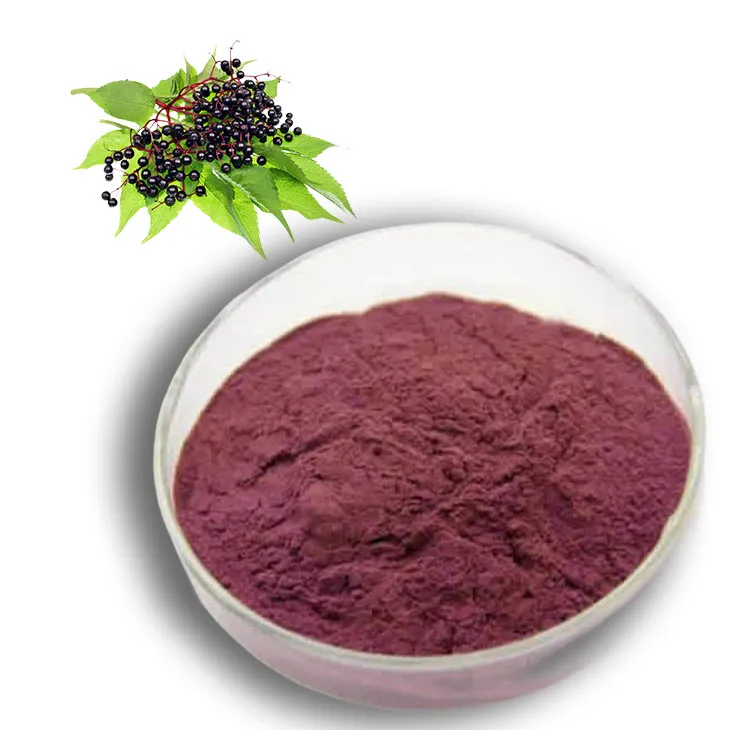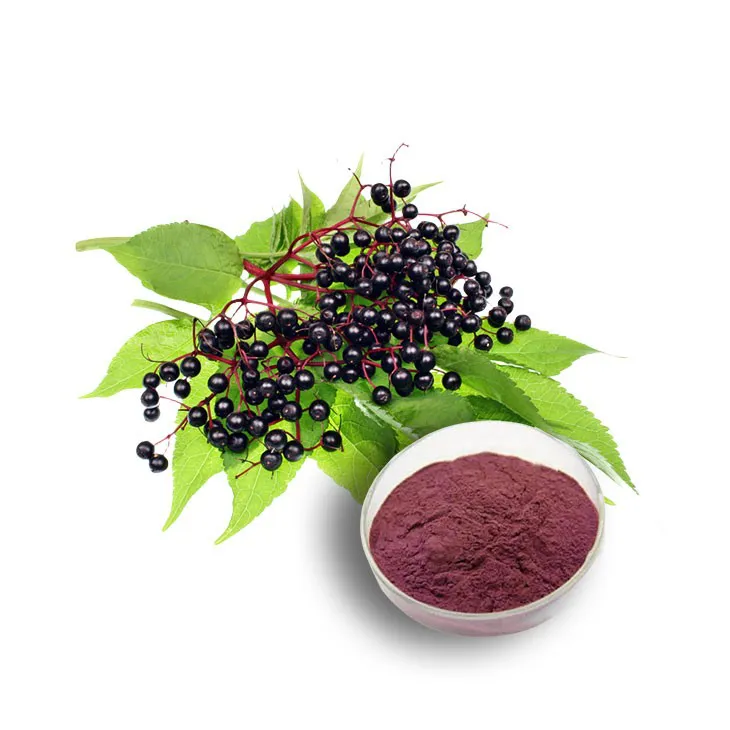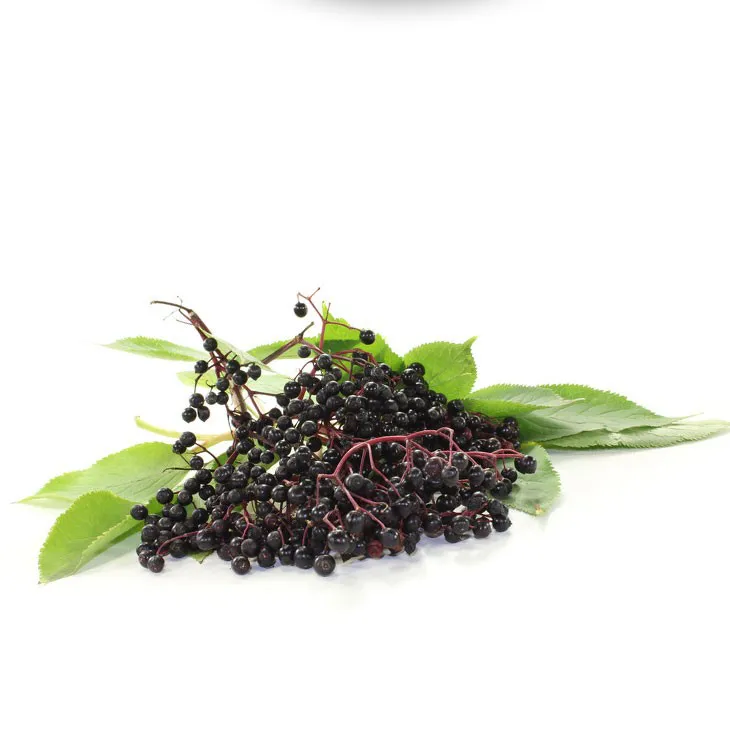- 0086-571-85302990
- sales@greenskybio.com
Benefits of Elderberry Extract in Cattle Feed.
2024-11-13

1. Introduction
The use of elderberry berry extract in bovine feed is emerging as a topic of great interest in the field of animal husbandry. As the demand for more sustainable and effective ways to rear cattle increases, natural additives like Elderberry Extract are being explored for their potential benefits. Elderberries have long been known for their various properties in human health, and now, their potential in enhancing cattle health and productivity is being investigated.

2. Reproductive Performance Enhancement
2.1 Hormonal Regulation
One of the most significant benefits of Elderberry Extract in cattle feed is its positive impact on reproductive performance. Cows' reproductive success is crucial for the sustainability and profitability of a cattle farm. The extract may contain substances that play a role in regulating hormonal balance. Hormones are the key drivers of the reproductive cycle in cows, including estrus, ovulation, and gestation.
For example, proper hormonal levels are essential for the cow to enter estrus regularly. If the hormonal balance is disrupted, it can lead to irregular estrus cycles, which in turn can reduce the chances of successful breeding. By providing Elderberry Extract in the feed, it is hypothesized that these hormonal imbalances can be corrected, thus increasing the likelihood of the cow being in a receptive state for breeding.
2.2 Success in Breeding and Calving
A well - regulated hormonal system also contributes to better breeding outcomes. When the hormonal levels are optimal, the quality of ova produced by the cow is likely to be higher. This can lead to increased fertilization rates when the cow is inseminated. Moreover, during gestation, hormonal balance is crucial for the proper development of the fetus.
In addition, elderberry extract may also have a positive impact on the cow's ability to carry the calf to full term and give birth successfully. Calving difficulties can be a major concern in cattle farming, and any factor that can improve the overall reproductive health of the cow can potentially reduce the incidence of dystocia (difficult birth).

3. Environmental Advantages
3.1 Reducing the Need for Sick - Animal Treatment
Elderberry extract offers an environmentally friendly option in cattle farming. By improving the health of cattle through natural means, it can reduce the environmental impact associated with treating sick animals. When cows are healthier, there is less need for medical interventions such as the use of antibiotics and other drugs.
The overuse of antibiotics in livestock farming has been a major environmental concern. Antibiotics can find their way into the environment through manure and urine, which can then lead to the development of antibiotic - resistant bacteria in the soil and water sources. By using elderberry extract to boost the cows' natural immunity and overall health, the reliance on antibiotics can be decreased, thus reducing this environmental risk.
3.2 Waste Management and Chemical Runoff
Sick animals also produce more waste due to factors such as reduced feed efficiency and increased water consumption. This can put additional strain on waste management systems on the farm. By keeping the cattle healthier with elderberry extract, the amount of waste produced can be more manageable.
Chemical runoff from farms is another environmental issue. When drugs are used to treat sick animals, there is a risk that these chemicals can be washed off the land into waterways during rainfall or irrigation. Using elderberry extract as a natural alternative can help in reducing this chemical runoff, as there are no synthetic chemicals involved in its use for promoting cattle health.

4. Feed Palatability Improvement
4.1 Taste Appeal for Cows
Another advantage of elderberry extract in cattle feed is its ability to enhance the feed palatability. Cows, like all animals, have preferences when it comes to the taste of their food. Elderberry extract can add a unique flavor to the feed that is more appealing to cows.
This is important because if the cows do not like the taste of their feed, they may consume less of it. A less palatable feed can lead to reduced feed intake, which can have a negative impact on the cows' growth rate, milk production (in dairy cows), and overall health.
4.2 Impact on Feed Intake and Growth Rates
When the feed is more palatable due to the addition of elderberry extract, cows are more likely to consume it in sufficient quantities. Adequate feed intake is essential for providing the necessary nutrients for growth, maintenance, and production.
In young cattle, increased feed intake can lead to better growth rates. This means that they can reach their market weight more quickly, which is beneficial for beef producers. In dairy cows, proper feed intake is crucial for maintaining high milk production levels. If the cows are consuming more feed because of its improved taste, it can potentially lead to increased milk yields.
5. Nutritional Benefits
5.1 Vitamin and Mineral Content
Elderberries are rich in vitamins such as vitamin C, vitamin A, and some B - vitamins. These vitamins are essential for the overall health of cattle. Vitamin C, for example, is important for the immune system of the cows, helping them to fight off diseases. Vitamin A is crucial for good vision, proper growth, and reproduction.
In addition to vitamins, elderberries also contain minerals like potassium, calcium, and iron. Calcium is necessary for strong bones and teeth in cattle, which is especially important for growing calves. Iron is involved in the formation of hemoglobin, which is responsible for transporting oxygen in the blood.
5.2 Antioxidant Properties
Elderberry extract also has antioxidant properties. Oxidative stress can occur in cattle due to various factors such as environmental stressors, poor diet, or disease. Antioxidants help to neutralize free radicals in the body, which can cause damage to cells and tissues.
By providing antioxidant - rich elderberry extract in the feed, the overall health of the cattle can be improved. This can lead to reduced incidence of diseases related to oxidative stress, such as certain types of infections and organ damage.
6. Immune System Boost
6.1 Strengthening the Immune Response
The substances present in elderberry extract can play a role in strengthening the immune system of cattle. A strong immune system is crucial for protecting the cows from various diseases, both infectious and non - infectious.
When the immune system is boosted, the cows are better able to recognize and fight off pathogens such as bacteria, viruses, and parasites. This can reduce the incidence of diseases on the farm, which is beneficial not only for the health of the individual cows but also for the overall productivity of the herd.
6.2 Disease Prevention
By preventing diseases, the need for treatment is reduced, which again has environmental and economic benefits. Fewer sick animals mean less use of drugs and less disruption to the normal growth and production cycles of the herd.
In addition, a healthy herd is more likely to be resistant to new and emerging diseases, which can be a significant threat in the modern agricultural environment.
7. Digestive Health Promotion
7.1 Improving Digestion
Elderberry extract may also have a positive impact on the digestive health of cattle. It can potentially help in improving the digestion of feed, which is essential for extracting the maximum nutrients from the feed.
Good digestion is necessary for the proper absorption of nutrients such as proteins, carbohydrates, and fats. If the digestive process is inefficient, the cows may not be getting all the nutrients they need from their feed, even if they are consuming an adequate amount.
7.2 Gut Microbiota and Elderberry Extract
The gut microbiota of cattle plays a vital role in their digestive health. Elderberry extract may interact with the gut microbiota in a beneficial way. It could potentially promote the growth of beneficial bacteria in the gut while suppressing the growth of harmful bacteria.
A healthy gut microbiota is associated with better digestion, improved immune function, and overall health of the cows. By influencing the gut microbiota, elderberry extract can contribute to the well - being of the cattle in multiple ways.
8. Conclusion
In conclusion, elderberry extract has numerous potential benefits when used in cattle feed. It can enhance reproductive performance, offer environmental advantages, improve feed palatability, provide nutritional benefits, boost the immune system, and promote digestive health. As the demand for more sustainable and efficient cattle farming practices grows, further research into the use of elderberry extract in bovine feed is warranted. This natural additive has the potential to revolutionize the way we rear cattle, providing a more holistic approach to animal health and productivity while also being environmentally friendly.
FAQ:
1. How does elderberry extract promote better reproductive performance in cows?
The extract may contain substances that regulate hormonal balance. Hormonal balance is crucial for successful breeding and calving in cows, and the substances in elderberry extract can help maintain or adjust this balance, thus promoting better reproductive performance.
2. Why is using elderberry extract in cattle feed an environmentally friendly option?
By improving the health of cattle through natural means, using elderberry extract can reduce the environmental impact associated with treating sick animals. For example, there will be less waste management issues and chemical runoff because healthier animals require less medical treatment that often involves chemicals and generates waste.
3. How does elderberry extract enhance feed palatability for cows?
The exact mechanism may not be fully understood, but it is known that cows are more likely to consume feed that tastes good. Elderberry extract somehow imparts a flavor or quality to the feed that makes it more appealing to cows, which in turn leads to increased feed intake.
4. Can elderberry extract replace other additives in cattle feed?
It may not necessarily replace all other additives, but it can be a valuable addition. While it has benefits such as promoting reproductive performance, being environmentally friendly, and enhancing palatability, other additives may serve different functions like providing specific nutrients. However, in some cases where its functions overlap with other additives, it could potentially reduce the need for those.
5. How much elderberry extract should be added to cattle feed?
The appropriate amount of elderberry extract to add to cattle feed would depend on various factors such as the age, weight, and overall health of the cattle, as well as the composition of the existing feed. Further research is needed to determine the optimal dosage, but it should be added in a carefully measured amount to ensure its benefits are maximized without causing any negative effects.
Related literature
- The Role of Botanical Extracts in Livestock Nutrition"
- "Beneficial Effects of Natural Extracts on Cattle Health and Productivity"
- "Elderberry: Properties and Potential Applications in Animal Feed"
- ▶ Hesperidin
- ▶ citrus bioflavonoids
- ▶ plant extract
- ▶ lycopene
- ▶ Diosmin
- ▶ Grape seed extract
- ▶ Sea buckthorn Juice Powder
- ▶ Beetroot powder
- ▶ Hops Extract
- ▶ Artichoke Extract
- ▶ Reishi mushroom extract
- ▶ Astaxanthin
- ▶ Green Tea Extract
- ▶ Curcumin Extract
- ▶ Horse Chestnut Extract
- ▶ Other Problems
- ▶ Boswellia Serrata Extract
- ▶ Resveratrol Extract
- ▶ Marigold Extract
- ▶ Grape Leaf Extract
- ▶ blog3
- ▶ blog4
- ▶ blog5
-
Organic Tongkat Ali extract powder factory.
2024-11-13
-
How to make powder with ashwagandha extract.
2024-11-13
-
Rosehip extract manufacturers from China.
2024-11-13
-
The best cat's claw extract in nature.
2024-11-13
-
Chinese Dandelion Leaf Extract Suppliers.
2024-11-13
-
Artichoke Extract
2024-11-13
-
Astaxanthin
2024-11-13
-
Coix Seed Extract
2024-11-13
-
Thunder God Vine Extract
2024-11-13
-
Mulberry Extract
2024-11-13
-
Acerola Extract
2024-11-13
-
Kelp Extract Powder
2024-11-13
-
Ginger Extract
2024-11-13
-
Eucommia Ulmoides Extract
2024-11-13
-
Uridine-5'-monophosphate Disodium salt
2024-11-13





















